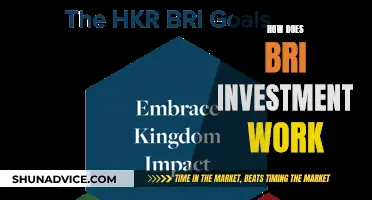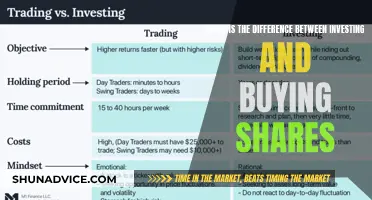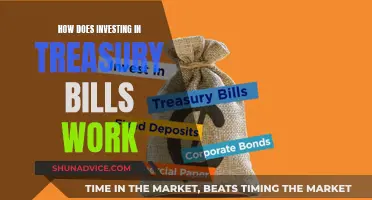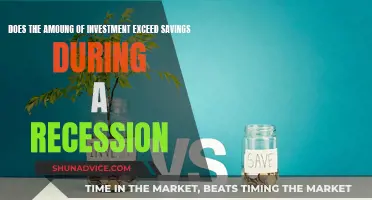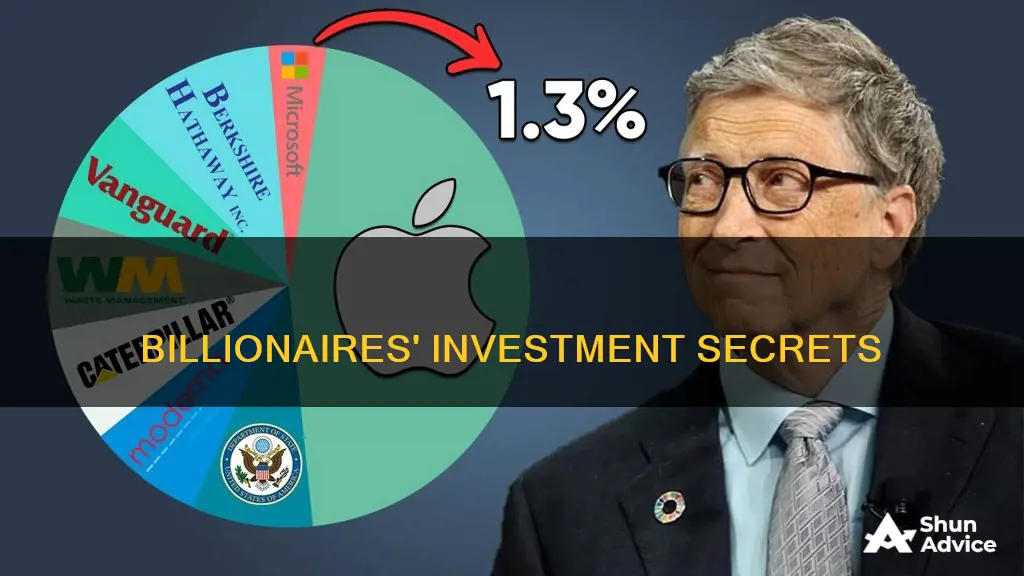
The ultra-wealthy, or ultra-high-net-worth individuals (UHNWIs), are people with a net worth of at least $30 million. UHNWIs make their money through a variety of investments, including stocks and shares, commercial property, bonds, private equity, and investments of passion like art, cars, and wine.
UHNWIs understand the importance of having their money work for them and know how to take calculated risks. They also tend to invest in private markets, rather than public ones, and are not afraid to invest in emerging markets outside of the US and the EU, such as Indonesia, Chile, and Singapore.
| Characteristics | Values |
|---|---|
| Equities | 26% of the average UHNWI's portfolio |
| Commercial property | 21% direct investment, 13% through debt funding or REITs |
| Bonds | 17% |
| Private equity/venture capital | 9% |
| Investments of passion (art, cars, wine) | 5% |
| Gold | 3% |
| Crypto | 2% |
| Other | 7% |
What You'll Learn

Commercial property
The most common type of commercial property that the wealthy invest in is offices, with 43% of respondents to a survey saying their clients currently invest in this type of property. However, the healthcare sector is the most popular, with a 35% representation.
Environmental factors are also significant when it comes to choosing which properties to invest in, with 57% saying their clients consider whether the property has a green energy source. Sustainability is an increasingly important consideration for the ultra-wealthy, with almost two-thirds of ultra-high-net-worth individuals (UHNWIs) attempting to reduce their carbon footprint and putting sustainability front and centre in their commercial real estate investment strategies.
In 2023, commercial real estate had a disastrous year, with investment volumes falling by almost half due to high debt costs. However, Middle Eastern and Asian investors are expected to have the most appetite to buy commercial real estate in 2024, as lower values, lower interest rates, and some forced selling will allow for improved investment volumes.
Overall, commercial property is a stable and lucrative investment choice for the rich, offering higher returns and added tax benefits.
Starbucks: Worth Your Investment?
You may want to see also

Equities
In 2022, Warren Buffett's Berkshire Hathaway spent a record $68 billion on stocks as value re-emerged in the market, according to its latest annual report.
The ultra-wealthy understand the value of physical assets and allocate their money accordingly. They invest in private and commercial real estate, land, gold, and even artwork. Real estate is a popular asset class in their portfolios to balance out the volatility of stocks.
While it may be intimidating to smaller investors due to the lack of liquidity and higher investment price point, ownership of illiquid assets, especially those uncorrelated with the market, is beneficial to any investment portfolio. These assets are less susceptible to market swings and pay off over the long term.
UHNWIs also find opportunities in private markets that are overlooked by investors who focus only on public markets. They understand that real wealth is generated in the private markets, and many gain a lot of their initial wealth from private businesses, often through business ownership or as an angel investor in private equity.
UHNWIs also invest in companies that are not yet on the stock market through private equity and venture capital. The latter is riskier but offers the potential for high growth.
- IShares Core ETFs (exchange-traded funds)
- IShares Edge Smart Beta ETFs
- IShares Core S&P 500 ETF
- IShares Core S&P U.S. Value ETF
- IShares Core S&P U.S. Growth ETF
- IShares Core MSCI Total International Stock ETF
- IShares Core MSCI EAFE ETF
- IShares Core MSCI Emerging Markets ETF
- IShares Edge MSCI Min Vol USA ETF
- IShares Edge MSCI Multifactor USA ETF
- IShares Edge MSCI USA Value Factor ETF
Middle-Aged Investors: Saving Enough?
You may want to see also

Art, cars, and wine
Art
Art has been a status symbol for the rich since time immemorial. In 2021, the global art market was valued at $65.1 billion, and it continues to grow. Art is often seen as a strategic investment, with modern art pieces potentially increasing significantly in value over time. For example, a Leonardo da Vinci painting sold for a record-breaking $450 million in 2017. Art also offers tax advantages in some countries, such as the United States, where purchasing expensive art can help individuals avoid capital gains tax. Additionally, art provides a secure place for funds, as its market rate fluctuations differ from those of the stock market, making it a good hedge against economic crises.
Cars
While some wealthy individuals may choose to invest in luxury or sports cars, others take a more frugal approach, opting for older or used vehicles to save money. This strategy, employed by some millionaires, involves driving a car for an extended period, often over ten years, to reduce costs associated with frequent new car purchases. Older cars also tend to have lower insurance, tax, and maintenance expenses.
Wine
Wine, especially rare vintages, can be a valuable investment for the wealthy. Similar to art, wine offers a way to diversify one's portfolio and hedge against economic uncertainty. Fine wines, like those from Bordeaux or Burgundy, can increase in value over time, making them a lucrative investment. Additionally, investing in wine can provide tax benefits, as wine is considered a "wasting asset" in some countries, which means it is exempt from certain taxes, such as capital gains tax.
In conclusion, art, cars, and wine offer the rich alternative investment opportunities that can bring substantial financial gains while also providing a means to diversify their portfolios and, in some cases, take advantage of tax benefits.
Investing: A Guide for Every Age
You may want to see also

Crypto and NFTs
Crypto Billionaires
Crypto billionaires include the likes of Elon Musk, Brian Armstrong, and Sam Bankman-Fried. Armstrong, the CEO of Coinbase, is worth an estimated $11.2 billion, while Bankman-Fried, despite losing his billionaire status following the collapse of FTX, is still worth $3 million. Changpeng Zhao, the founder and former CEO of Binance, is crypto's wealthiest person, with a net worth of $33 billion. Other crypto billionaires include the Winklevoss twins, Tim Draper, and Michael Saylor, who is the biggest crypto billionaire gainer in percentage terms.
NFTs
NFTs, or non-fungible tokens, are unique digital assets that have gained immense popularity in recent years. The founders of NFT marketplace OpenSea, Devin Finzer and Alex Atallah, were among the first NFT billionaires, with their stakes in the company valued at approximately $2.2 billion each in 2022. Another NFT marketplace, LooksRare, gave away $400 million in tokens, but with a catch—to claim the airdrop, you had to have traded over 3 ETH worth of assets on the OpenSea marketplace.
Barriers to Entry
While crypto and NFTs have the potential to redistribute power and wealth, they currently seem to be doing the opposite. The barriers to entry are high, with the floor price of a parcel of land in the metaverse costing around $10,000. Early access to NFT drops also requires being in the know, which means building relationships and spending time scanning crypto forums and Discord channels. Furthermore, investment DAOs, which pool funds to invest in blockchain-based startups, require a large upfront investment, with some groups mandating a minimum investment of $200,000. As such, it appears that if power and wealth are being redistributed, they are being redistributed to younger millennials and Gen-Z individuals with capital, time, and education.
Rich People's Role in Economic Development
You may want to see also

Gold
However, it is important to note that gold is not a guaranteed path to overnight riches. Instead, gold is most effective when used as part of a robust, diversified portfolio. It is also subject to price volatility and may not always increase with inflation.
According to Knight Frank's 2023 "Wealth Report", the world's richest people allocate, on average, 3% of their investments to gold. While this is a relatively small proportion of their portfolios, it still highlights the perceived value of gold as a safe and stable investment option.
Club Members: Cramer's Investing Army
You may want to see also
Frequently asked questions
The world's richest people invest in a variety of things, including stocks and shares, property, bonds, private equity, and "investments of passion" like art, cars, and wine.
Stocks and shares make up the biggest individual contribution to the portfolios of the world's richest people, with 26% of the average ultra-high net worth individual's portfolio held in equities.
The richest people invest in both residential and commercial property. Over a fifth of ultra-high net worth individuals are planning to buy residential property in 2024, while almost one-fifth are considering investing in commercial real estate.
"Investments of passion" are things like art, cars, and wine that are bought for enjoyment or as investments. They make up approximately 5% of the average portfolio of the world's richest people.



